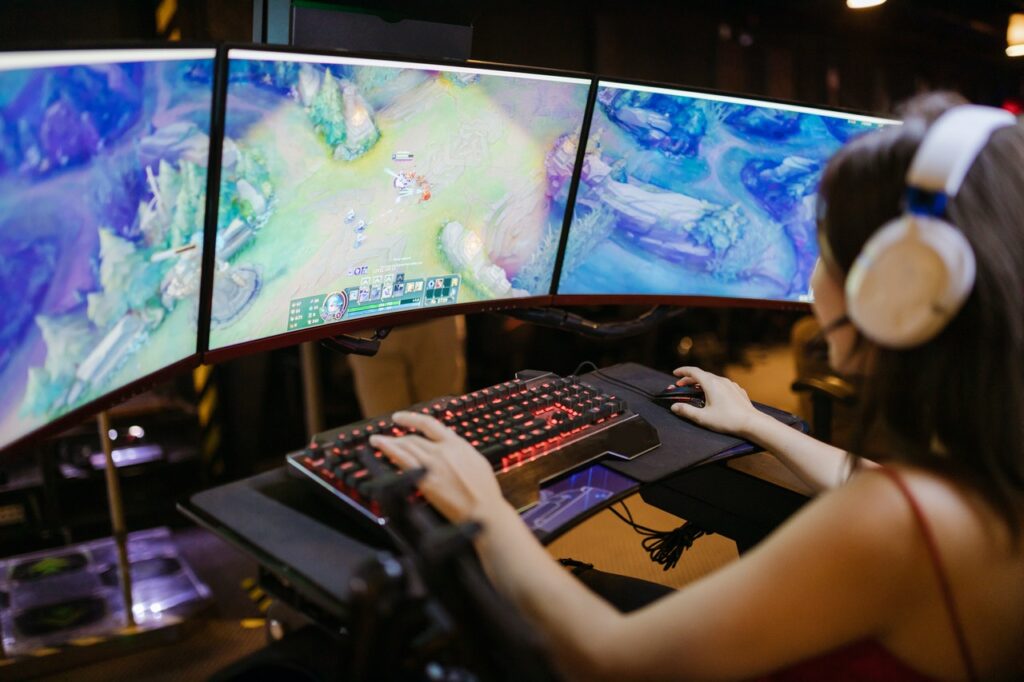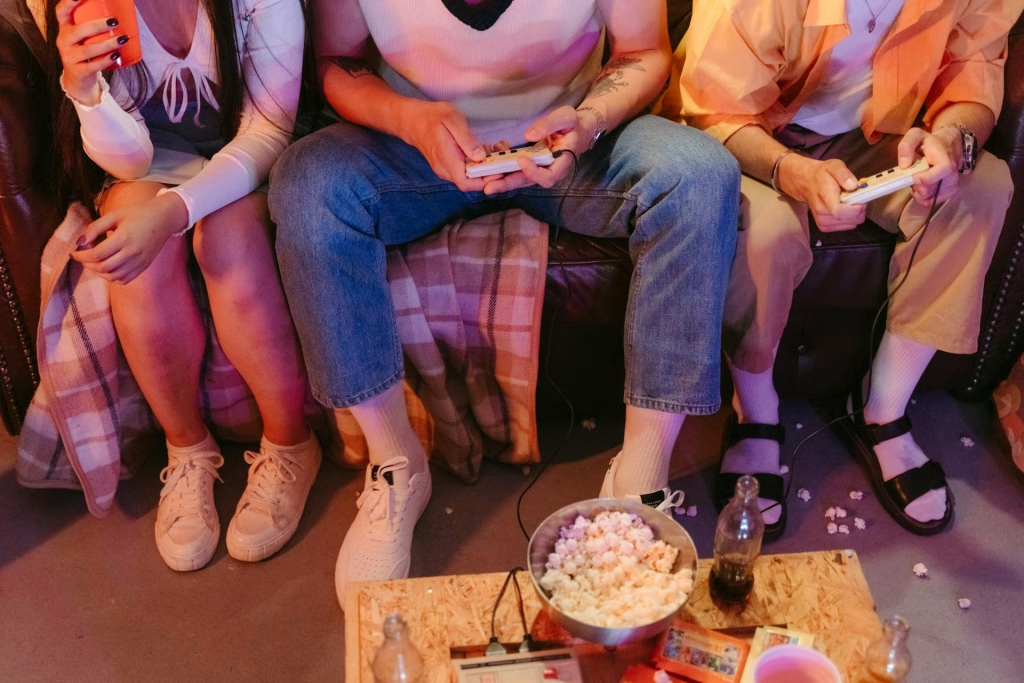Gamers sometimes tend to go through phases of self-reflection. External pressure or failure in other aspects of life might be the reason. As such, we have tons of questions ranging from whether gaming is good for anything to is gaming addiction even a real thing or not.
As it turns out, there is limited but pretty sense-making research already done on these subjects. And today we are going to go over the most critical points and findings of such research papers and studies.
For example, did you know that:
- The same areas “light up” in your brain when you think of online gaming (if you are an online gamer) that light up when drug addicts think of or are shown substances they are addicted to?[1]
- The World Health Organization added “gaming disorder” as a mental illness in 2018 in a revision that classifies any gaming-related behavior that negatively impacts your family, personal, social, educational, occupational, etc. life as a legitimate medical disorder such as depression or PTSD?
We will go over these and other relevant findings. This all might be scientifically backed but note that research is simply not sufficient by most modern models to conclusively prove anything in terms of gaming.
And no, addiction to buying the latest GPU as it releases at scalper prices is not gaming addiction. That’s just good old categorical dumbness.
Internet/online gaming addiction
Is online gaming a type of addiction? Depends on the frequency and impact of gaming. A pathological gamer hurting their social life is clearly a victim of videogame addiction. And this has become very common in online gaming scenarios.
Up until the beginning of the century, gaming addiction was largely localized to offline video games. This has changed a lot in the last 10-15 years. Online gaming addiction is perhaps more commonplace today than offline gaming addiction – or addiction to games that don’t have an internet multiplayer mode.
We had determined that gaming addiction has to be studied as a part of the socio-cultural environment as early as 2013[2].
A study of 18 studies[3] focusing on gaming addiction is a piece of pivotal literature. Empirical research tends to suggest that:
- Online gaming has the strongest association with compulsive internet use,
- Game-addicts play more, play longer, and display strong reward dependence,
- Escapism comes up as the key motivation predicating internet gaming addiction,
- Pathological gaming has a close affinity with low social competence, and
- High loneliness and lower self-esteem are usual precursors to gaming addiction.

Gaming improves wellbeing
There is ample proof that gaming aids in mental well-being in adults. A 2020 article in The Guardian addressed an Oxford University study that found people playing Animal Crossing and Plants vs. Zombies four hours a day reported better well-being.
The story of academics unearthing the good bits about gaming is not fresh. Gaming has always been closely associated with a negative social outlook. There are two primary factors:
- Parents typically prefer their children to stay away from games, which seemingly add no value and might make them more violent, anti-social, or any adjective that closely resembles “lame”. The ideal kid is always a bright, physically fit, and well-liked person of the immediate society – which a gamer can never be because they are sort of like living in a den.
- Research papers studying the psychological and psychosocial impact of gaming mostly always turn out to be negative. But this is in large part because of their reliance on large datasets and user-reported metrics.
The aforementioned study is actually a pioneering academic paper because it is one of the first studies into gaming that collect gaming data directly and not from user recollections. This paints a wholly different picture altogether. Gaming might have always been good; we just didn’t do the studies the right way (or we lacked the tools for it).
A couple of points to keep in mind:
- Animal Crossing and Plants vs. Zombies are fun games. Playing a competitive title for 4 hours a day is different and has to be tested separately before anything generalized can be claimed.
- Screen time can lead to visual impairment, especially on smaller screens such as smartphones, tablets, or consoles like the Switch. This is physical impairment not to be evidenced against the mental benefits of gaming. In this physical regard, gaming is no different than using any other application or doing any other task, including work, on the same screen.
Other valid points
Here are some other considerations on the subject.
Gaming obsession and OCD
Researchers in South Korea studied many individuals who played online games for long hours every day. They took brain scans of these people and compared them to brain scans of people who did not have an online gaming addiction. They found significant differences in the brains of those with the addiction.
For example, they found abnormal activity in certain parts of the brain, called the anterior cingulate cortex and insula, which are parts of the brain that are used in processing emotions.
Interestingly, these parts of the brain are also overactive in people who suffer from obsessive-compulsive disorder (OCD), which is known to be related to anxiety disorders.

Diagnostic criteria for problematic use of computer games
A person can be diagnosed as addicted to gaming in the following cases.
- Preoccupation with playing online games.
- Withdrawal symptoms when gaming is taken away or not possible, including anger, depression, relief, tension, and/or frustration.
- Tolerance – this can be seen as the need to spend increasing amounts of time engaged in RPGs.
- Unsuccessful attempts to control participation in online games.
- Loss of interest in previous hobbies and entertainment as a result of and with the exception of online games.
- Continued excessive use of online games despite knowledge of psychosocial problems.
- Has deceived family members, therapists, or others regarding the amount of time spent playing online games.
- Use of online games to escape or relieve a dysphoric mood (i.e., feelings of hopelessness, guilt, anxiety, depression).
- Has jeopardized or lost a significant relationship, job, educational, or career opportunity because of participation in online games.
WHO’s definition of gaming disorder
The World Health Organization has officially recognized “gaming disorder” as a mental health condition — an obsessive compulsion to play video games that gets in the way of other daily activities.
An increasing number of clinical studies and reports from health care professionals have described the new condition as a serious problem affecting people of all ages, including some children, worldwide.
The WHO’s decision to recognize gaming addiction as a distinct disorder came after years of debate and research into its cause, symptoms, and treatments. The decision, made at the organization’s annual assembly in June, was announced Monday in the latest update to its International Classification of Diseases.
The disorder is defined by the WHO as “impaired control over gaming,” increasing priority given to gaming over other interests and daily activities, excessive use of video games despite negative consequences, and continued excessive use despite knowing about physical or psychological issues caused or exacerbated by gaming.
Those who are addicted may experience a range of symptoms including irritability, sleep problems, and decreased appetite.
The WHO defines addictive gaming behavior as being present if at least one symptom is exhibited within 12 months.
Do video games make you violent?
Many studies have found absolutely no correlation between aggression and pathological gaming addiction, including a 2006 study[4]. But in a few studies, the risk of greater impulsivity and increased physical aggression in boys has been reported in 2009-10.
Again, research is sparse and small.
The best way to determine the relationship between violence and gaming addiction is to judge each gamer as an individual case.
A fairly strong opinion of gamers in this regard is that individuals with naturally violent, aggressive, or impulsive intents simply find games to be a good outlet, and as a result, this connection can be made between the two things which foreshadow the entire gaming community.
We need more and bigger studies to conclusively prove or disprove any claim in this matter.


Rapid-fire
Here is the tl;dr crunch.
- What is gaming addiction? Compulsive and uncontrolled video gaming which causes problems in the family, social, personal, work, or school life. Gaming addiction is a legitimate mental disorder.
- What are the signs of video game addiction? Always thinking of games, getting frustrated or sad when you cannot play, being able to feel good only after gaming, “escaping” into games, and of course, experiencing problems due to gaming that you find hard to justify to yourself.
- Does gaming cause addiction? TV screen time and scrolling social media for that dopamine hit are also addictions. Drug dependence, smoking, or drinking are also addictions. Similarly, excessive gaming can also cause gaming addiction.
- Is gaming addiction a mental disorder? Officially, the WHO made gaming disorder a mental health condition in 2018.
- How many hours a day turns into gaming addiction? Over 2 hours a day, every day, can be called a gaming addiction. Note that it also depends on what other activities you do and what type of games you play. Some games tend to take longer while giving the same amount of exhaustion or satisfaction as others which you might play for half the time.
Toxicity: Good gaming vs. bad gaming
Toxicity is a powerful stimulus that breeds frustration. This frustration can lead to negative behavior as well as the compulsion to “prove yourself”, thereby extending your gaming sessions.
A metric the majority of studies fail to take into account even when they specialize in online/internet gaming is the average toxicity or rather more stylishly, “saltiness” on the servers of a game. Even within games, this metric differs across servers, skill levels, languages, and sub-regions.
Measuring toxicity is impossible. Game developers have tried and failed, forever doomed to perfect an algorithm that will never truly fulfill its destiny.
The high variance within popular internet gaming titles doesn’t help either.
For example, the toxicity in the Southeast Asian server of any leading free-to-play MOBA’s low-skill brackets is extremely different from the toxicity in the West Europe server of a mainly pay-to-win multiplayer’s upper skill bracket with high user spends.
If a gamer in a fairly bad spot in a toxic bracket makes the switch to a hypothetically “cleaner” game with most of the features that they like, it’s understandable how that would affect their lives positively. This is the difference between good and bad gaming.
Bad gaming is an endless pursuit of achieving something made very difficult to achieve. For example, reaching a certain coveted title, tier, bracket, or rank when you are very low (often termed trench) by pushing through toxic players in a game where victory depends on teamwork is remarkably frustrating and can lead to negative behaviors typically associated with gaming addiction.
References
- January-February 2011. Doug H. Han, Nicolas Bolo, Melissa A. Daniels, Lynn Arenella, In K. Lyoo, and Perry F. Renshaw, “Brain activity and desire for Internet video game play” – Comprehensive Psychiatry.
- November 14, 2013. Daria J. Kuss, “Internet gaming addiction: current perspectives” – Psychology Research and Behavior Management.
- November 3, 2011. Daria J. Kuss and Mark D. Griffiths, “Online gaming addiction in children and adolescents: A review of empirical research” – International Gaming Research Unit, Nottingham Trent University, UK.
- October 24, 2006. Philip A. Chan and Terry Rabinowitz, “A cross-sectional analysis of video games and attention deficit hyperactivity disorder symptoms in adolescents” – Annals of General Psychiatry.





